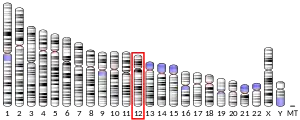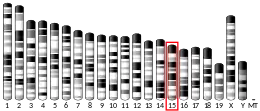MFSD5
Major facilitator superfamily domain containing 5 is an atypical SLC expressed in neuronal plasma membrane.[5] It is a plausible Solute carrier transporter.[6] It transports molybdate anions,[7] and it interacts with GLP-1R.[8]
| MFSD5 | |||||||||||||||||||||||||||||||||||||||||||||||||||
|---|---|---|---|---|---|---|---|---|---|---|---|---|---|---|---|---|---|---|---|---|---|---|---|---|---|---|---|---|---|---|---|---|---|---|---|---|---|---|---|---|---|---|---|---|---|---|---|---|---|---|---|
| Identifiers | |||||||||||||||||||||||||||||||||||||||||||||||||||
| Aliases | MFSD5, hsMOT2, major facilitator superfamily domain containing 5, SLC61A1 | ||||||||||||||||||||||||||||||||||||||||||||||||||
| External IDs | MGI: 2145901 HomoloGene: 69517 GeneCards: MFSD5 | ||||||||||||||||||||||||||||||||||||||||||||||||||
| |||||||||||||||||||||||||||||||||||||||||||||||||||
| |||||||||||||||||||||||||||||||||||||||||||||||||||
| |||||||||||||||||||||||||||||||||||||||||||||||||||
| |||||||||||||||||||||||||||||||||||||||||||||||||||
| |||||||||||||||||||||||||||||||||||||||||||||||||||
| Wikidata | |||||||||||||||||||||||||||||||||||||||||||||||||||
| |||||||||||||||||||||||||||||||||||||||||||||||||||
MFSD5 belongs to AMTF6.[9]
References
- GRCh38: Ensembl release 89: ENSG00000182544 - Ensembl, May 2017
- GRCm38: Ensembl release 89: ENSMUSG00000045665 - Ensembl, May 2017
- "Human PubMed Reference:". National Center for Biotechnology Information, U.S. National Library of Medicine.
- "Mouse PubMed Reference:". National Center for Biotechnology Information, U.S. National Library of Medicine.
- Perland E, Lekholm E, Eriksson MM, Bagchi S, Arapi V, Fredriksson R (2016). "The Putative SLC Transporters Mfsd5 and Mfsd11 Are Abundantly Expressed in the Mouse Brain and Have a Potential Role in Energy Homeostasis". PLOS ONE. 11 (6): e0156912. Bibcode:2016PLoSO..1156912P. doi:10.1371/journal.pone.0156912. PMC 4896477. PMID 27272503.
- Perland E, Fredriksson R (March 2017). "Classification Systems of Secondary Active Transporters". Trends in Pharmacological Sciences. 38 (3): 305–315. doi:10.1016/j.tips.2016.11.008. PMID 27939446.
- Tejada-Jiménez M, Galván A, Fernández E (April 2011). "Algae and humans share a molybdate transporter". Proceedings of the National Academy of Sciences of the United States of America. 108 (16): 6420–6425. Bibcode:2011PNAS..108.6420T. doi:10.1073/pnas.1100700108. PMC 3080982. PMID 21464289.
- Huang X, Dai FF, Gaisano G, Giglou K, Han J, Zhang M, et al. (September 2013). "The identification of novel proteins that interact with the GLP-1 receptor and restrain its activity". Molecular Endocrinology. 27 (9): 1550–1563. doi:10.1210/me.2013-1047. PMC 5415235. PMID 23864651.
- Perland E, Bagchi S, Klaesson A, Fredriksson R (September 2017). "Characteristics of 29 novel atypical solute carriers of major facilitator superfamily type: evolutionary conservation, predicted structure and neuronal co-expression". Open Biology. 7 (9): 170142. doi:10.1098/rsob.170142. PMC 5627054. PMID 28878041.
This article is issued from Wikipedia. The text is licensed under Creative Commons - Attribution - Sharealike. Additional terms may apply for the media files.



